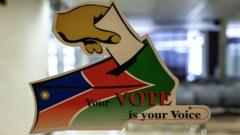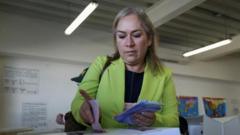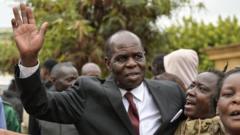Across the continent, citizens are increasingly expressing discontent with longstanding regimes, showcasing a growing demand for accountability and reform in governance.
Governments Face Electoral Wrath as Voters Demand Change in Africa

Governments Face Electoral Wrath as Voters Demand Change in Africa
Amid a year of electoral upheaval in sub-Saharan Africa, governing parties are losing ground to opposition movements, signaling a notable shift in political dynamics.
In a remarkable turn of events, Africa’s political landscape is being reshaped as governing parties face significant electoral challenges that jeopardize their long-standing rule. Notable among these is Namibia's ruling party, Swapo, which retained power after over three decades but saw a dwindling grip, winning only 57% of the votes amid widespread claims of electoral irregularities. Opposition leaders have decried the election results, particularly shocked by how Swapo could increase its presidential vote share despite suffering a historical loss in parliamentary representation.
Namibia's struggles are not isolated; 2024 is proving to be an "annus horribilis" for many governments in the region, with incumbents across sub-Saharan Africa facing diminished support. Political upheaval has erupted in numerous elections where ruling parties have either lost significant parliamentary seats or, in some cases, completely lost power.
This year's elections have illustrated a broader trend of dissatisfaction with governing parties amid economic downturns and rising public intolerance toward corruption. Another compelling development is the emergence of united opposition coalitions that have effectively challenged the political status quo.
The Botswana Democratic Party (BDP), which ruled since the country’s independence in 1966, suffered a dramatic defeat in October, dropping from 38 to just four seats in parliament. Mauritius’s Alliance Lepep coalition faced a similar fate in November, with a mere 27% of the vote, greatly diminishing its parliamentary representation. Meanwhile, Senegal experienced a surprising electoral turnaround, as jailed opposition leaders were released just before elections, leading to their victory, which dethroned the incumbent.
Even in countries where ruling parties managed to retain power, such as South Africa's African National Congress (ANC), trust and political control have been notably weakened. The ANC’s historic shift below 50% of the national vote has forced its leadership to pursue coalition governance, drastically altering the political landscape.
As the year progresses, mounting citizen frustrations regarding economic mismanagement and rising living costs have become pivotal factors influencing voter sentiment. As seen in Kenya, these grievances have sparked protests against governments perceived as failing their citizens.
These electoral shifts in Africa are not singularly isolated; they echo a global narrative of growing public backlash against traditional ruling parties, as demonstrated in elections from the UK to the US. However, what sets Africa apart is the ability of opposition parties to learn and adapt from their past experiences, fostering deeper engagement with the electorate and uniting under common causes.
Looking forward, the trend of opposition victories may continue into 2025, posing significant challenges for ruling parties in countries such as Ghana and Malawi, where emerging voter discontent could lead to further political reinvention.
This unfolding political landscape asserts that despite facing turbulence and authoritarian streaks globally, Africa showcases commendable democratic resilience. As civic groups and citizens rally for accountability, they challenge the notion that effective multiparty politics are unattainable in the region, highlighting the nuanced dynamics within sub-Saharan Africa’s political framework.
Namibia's struggles are not isolated; 2024 is proving to be an "annus horribilis" for many governments in the region, with incumbents across sub-Saharan Africa facing diminished support. Political upheaval has erupted in numerous elections where ruling parties have either lost significant parliamentary seats or, in some cases, completely lost power.
This year's elections have illustrated a broader trend of dissatisfaction with governing parties amid economic downturns and rising public intolerance toward corruption. Another compelling development is the emergence of united opposition coalitions that have effectively challenged the political status quo.
The Botswana Democratic Party (BDP), which ruled since the country’s independence in 1966, suffered a dramatic defeat in October, dropping from 38 to just four seats in parliament. Mauritius’s Alliance Lepep coalition faced a similar fate in November, with a mere 27% of the vote, greatly diminishing its parliamentary representation. Meanwhile, Senegal experienced a surprising electoral turnaround, as jailed opposition leaders were released just before elections, leading to their victory, which dethroned the incumbent.
Even in countries where ruling parties managed to retain power, such as South Africa's African National Congress (ANC), trust and political control have been notably weakened. The ANC’s historic shift below 50% of the national vote has forced its leadership to pursue coalition governance, drastically altering the political landscape.
As the year progresses, mounting citizen frustrations regarding economic mismanagement and rising living costs have become pivotal factors influencing voter sentiment. As seen in Kenya, these grievances have sparked protests against governments perceived as failing their citizens.
These electoral shifts in Africa are not singularly isolated; they echo a global narrative of growing public backlash against traditional ruling parties, as demonstrated in elections from the UK to the US. However, what sets Africa apart is the ability of opposition parties to learn and adapt from their past experiences, fostering deeper engagement with the electorate and uniting under common causes.
Looking forward, the trend of opposition victories may continue into 2025, posing significant challenges for ruling parties in countries such as Ghana and Malawi, where emerging voter discontent could lead to further political reinvention.
This unfolding political landscape asserts that despite facing turbulence and authoritarian streaks globally, Africa showcases commendable democratic resilience. As civic groups and citizens rally for accountability, they challenge the notion that effective multiparty politics are unattainable in the region, highlighting the nuanced dynamics within sub-Saharan Africa’s political framework.




















